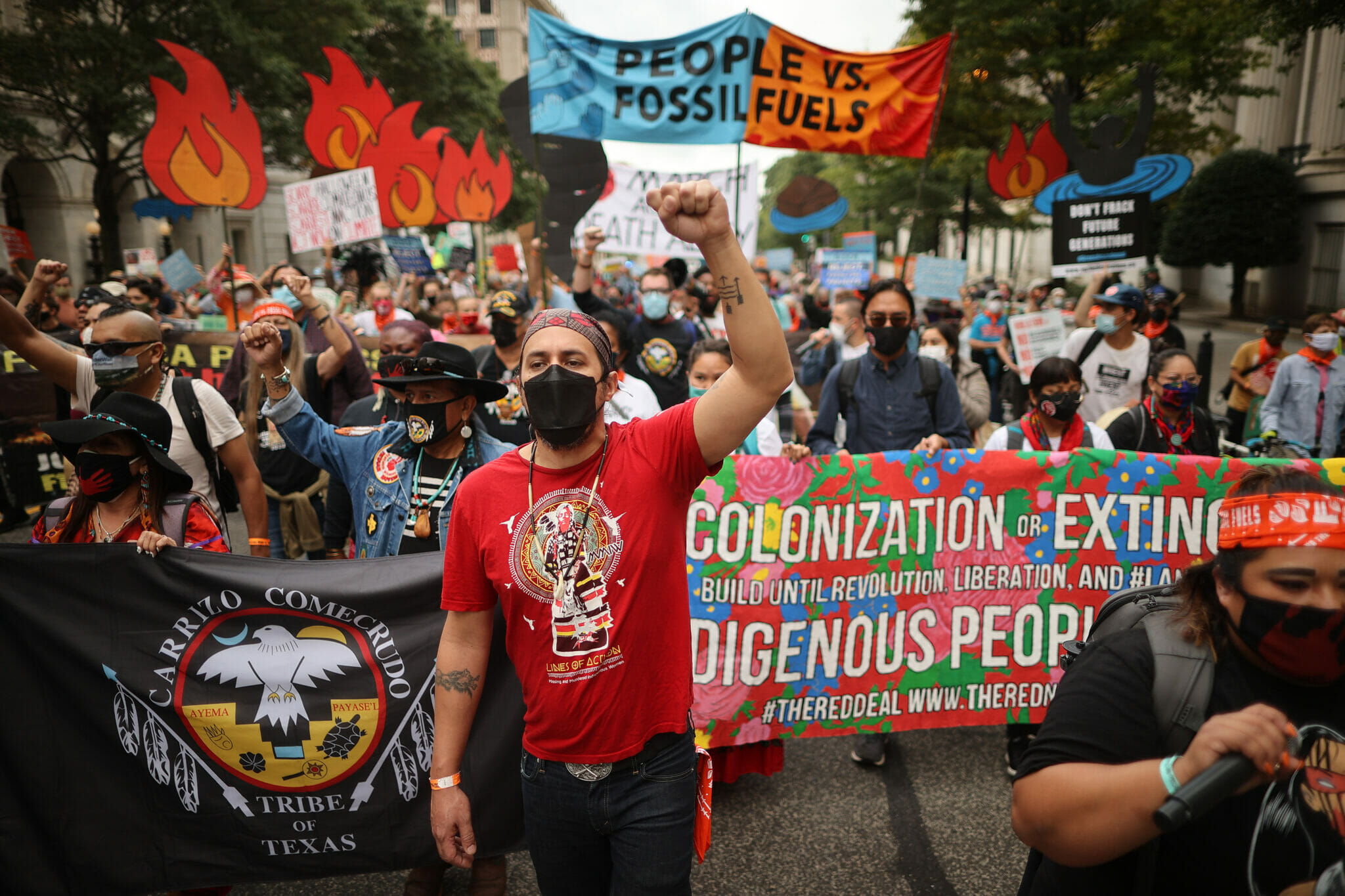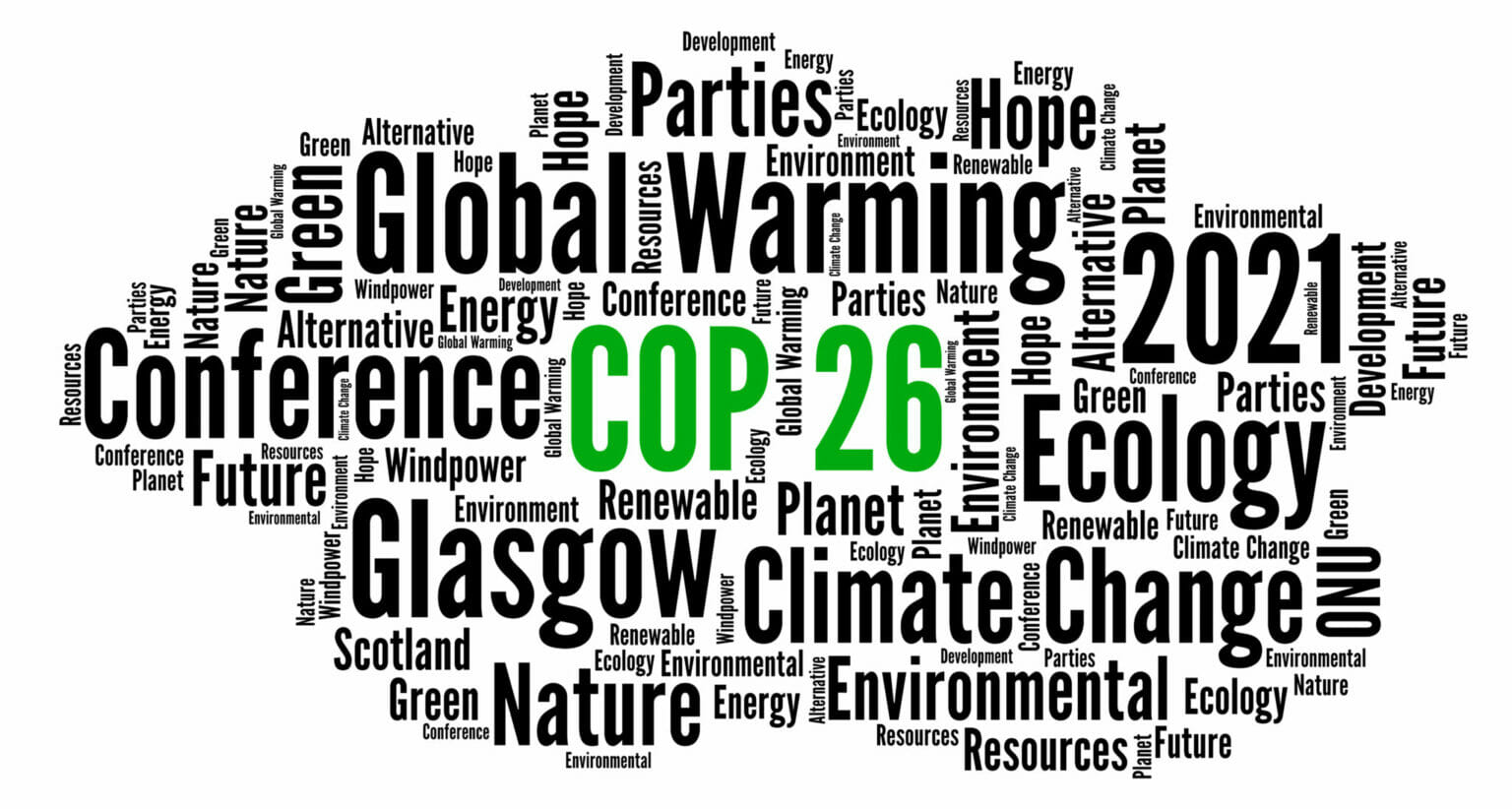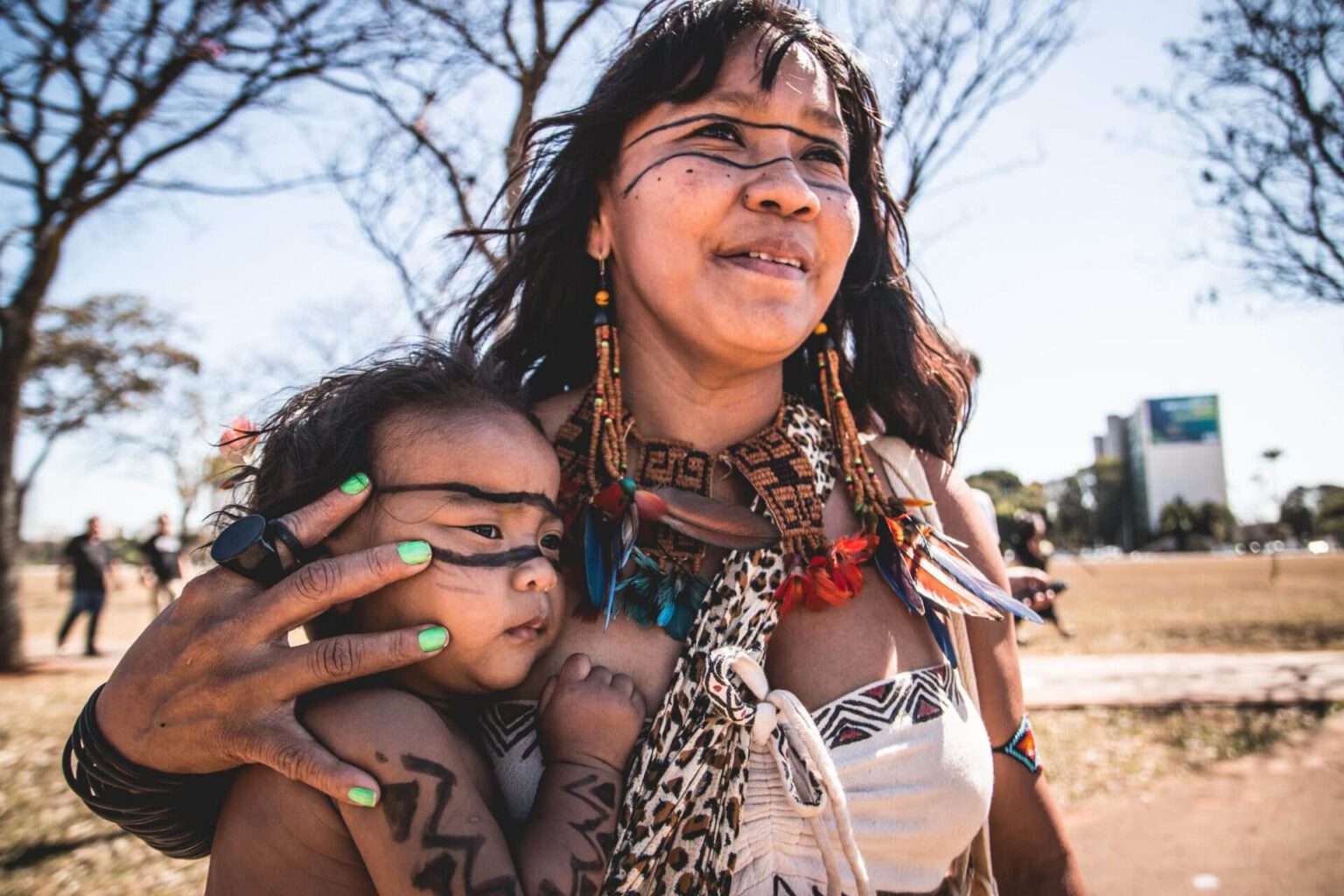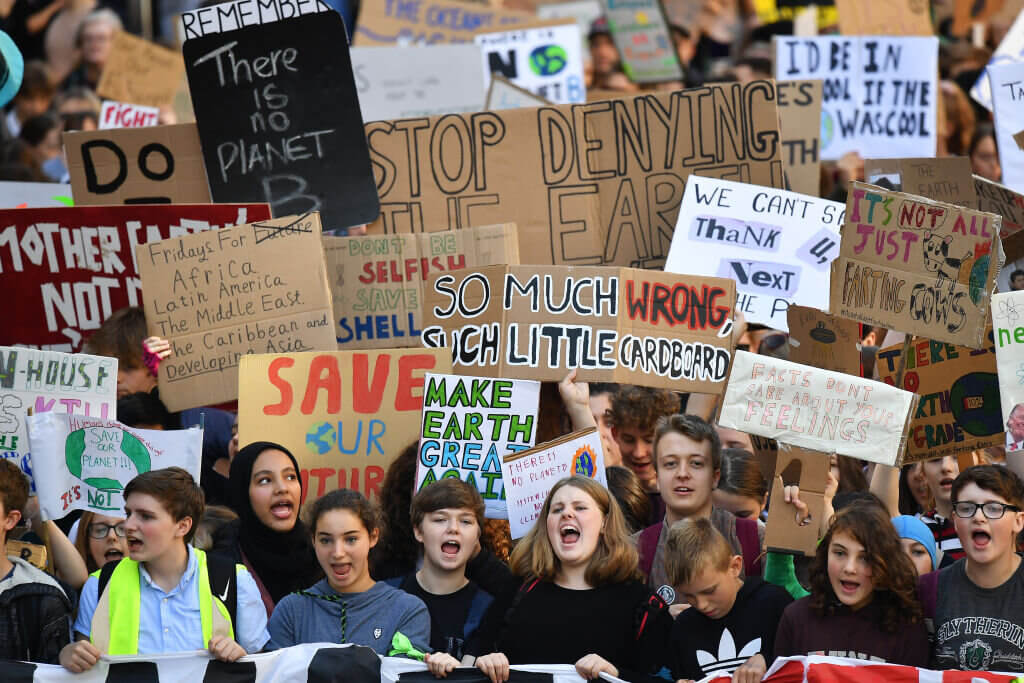Sign up to receive our weekly newsletter.
Activists, scientists, and other members of civil society qualify as newsmakers just as much as government officials and business executives — and we journalists should cover them accordingly. This week has furnished us with a few powerful reminders of that.
The climate activist Greta Thunberg, for example, is only echoing what thousands of scientists say when she states that humanity is faced with a “climate emergency.” How many heads of state or government use that phrase? In her interview with Covering Climate Now, conducted by CCNow partners NBC News, Reuters, and The Nation, the Swedish activist pointed out that governments “are still not counting all the emissions when … announcing targets” and “are still using creative accounting when it comes to emissions cuts.” Thunberg identified a key failure of governments on climate, one that most government officials aren’t keen to mention.
Thunberg also said that the only way world leaders will do better, including at the COP26 summit in Glasgow starting October 31, is if civil society brings “massive public pressure” to bear. A newsworthy example has been unfolding in Washington this week, as thousands of Indigenous-led demonstrators rallied outside of the White House as part of the “People vs Fossil Fuels” protests. Their demands? President Joe Biden should use his executive powers to declare the climate crisis a national emergency and put an end to all new fossil fuel projects.
Civil society is sounding the alarm, and they’re not alone. The intergovernmental agency, the International Energy Agency, has urged — first in a landmark report in May and again this week in its annual World Energy Outlook report — an end to new fossil fuel projects. Without such an end, the IEA says, the 1.5 degree Celsius temperature goal of the Paris Agreement is unreachable.
Established by the United States and other industrialized economies in response to the OPEC oil embargo of 1973, the IEA has recently evolved into a climate change truth-teller. The world economy’s “direction of travel,” this week’s report said, “is a long way from alignment” with 1.5 degrees C. Four measures can close the gap: shifting to zero-carbon electricity, a “relentless focus on energy efficiency,” cutting methane (i.e., natural gas) emissions, and clean energy innovation, including extracting carbon from the atmosphere. But “unambiguous direction from COP26” is imperative to make the 2020s “the decade of massive clean energy deployment” that science says is necessary.
Whether COP26 delivers that “unambiguous direction” is, of course, up to the world’s governments. But holding governments accountable is up to us as journalists. Civil society representatives can help us fulfill that responsibility. That doesn’t mean we should report their statements uncritically, any more than we should report anyone’s statements uncritically. It simply means that we should treat them as newsmakers.
From Us
Covering Climate Now is excited to host two separate press conferences next week with two officials at the heart of COP26 negotiations: COP26 president Alok Sharma and UN Secretary General António Guterres. Can Sharma and Guterres deliver success at the Glasgow summit, and what are their respective strategies for doing so? These online events are open only to CCNow partner journalists. You can pose your questions to Sharma and Guterres directly; a broadcast quality recording will be made available to all partners; and everyone is invited to run your stories as soon after the press conference as you’d like. (If your news outlet wants to join CCNow, there’s still time; please fill out this form and email us at editors@coveringclimatenow.org)
Don’t miss either of these opportunities to question two key players in the make-or-break Glasgow summit. The press conference with Sharma takes place on Tuesday, October 19, at 11am United States Eastern Time; you can RSVP here. The Guterres press conference is on Thursday, October 21, at 3pm US Eastern Time; RSVP here.
Essential Reading
$11 million a minute. The fossil fuel industry receives subsidies amounting to $11 million each minute, according to a new International Monetary Fund study. That’s about $5.9 trillion a year for an industry burning oil, gas, and coal at a time when fast cuts in emissions are needed. Jeff Goodell uses this fact as a jumping off point to deliver a brutally honest summary of the last 30 years of global climate politics: “The rich pollute. The poor suffer. And the rich really don’t care.” By Jeff Goodell at Rolling Stone…
Dead planet. A number of leading businesses, including Unilever, H&M and Holcim, have called on world leaders to take meaningful action and reverse nature loss by 2030 as the United Nations Conference on Biodiversity began in China this week. In an open letter, the group said the current draft of a Paris–style UN agreement for nature does not go far enough to stop destruction of the natural world, adding “there will be no business on a dead planet.” By Patrick Greenfield at The Guardian…
Depleted. The United Kingdom has only about half of its biodiversity left, making it one of the most nature-depleted countries in the world, according to new data. Biodiversity, the variety of all living things on Earth, brings countless benefits to humans, including oxygen, water, and food. It is declining faster than at any other time in history. By Helen Briggs at the BBC…
Methane cuts. Two dozen countries have signed on to the global methane reduction pact launched last month by the US and European Union. The initiative, which aims to cut methane emissions 30% by 2030, now includes nine of the top 20 global methane emitters. By Valerie Volcovici at Reuters…
Nearly everyone. At least 85% of the world’s population has experienced a weather event linked to human-caused climate change, such as a heat wave, flooding, or drought, according to a new study in Nature Climate Change. Scientists used machine learning to analyze over 100,000 climate change studies and found that global warming has impacted 80% of the world’s land. From Annabelle Timsit and Sarah Kaplan at the Washington Post…
Republication Recommendations
The following stories deserve special consideration for republication by CCNow partners:
Big tobacco got caught in a lie by Congress. Now it’s the oil industry’s turn– From the Guardian’s & CCNow’s “Climate Crimes” series
Thunberg says COP26 is time for leaders to be honest – Reuters
Greta Thunberg, en la antesala de la COP26: “Estamos muy, muy por detrás de lo que se necesita” (Translation of the story above by Reuters) – La Tercera
Greta Thunberg is “open” to meeting Biden at the UN climate summit – The Nation
For partner outlets: To submit stories for sharing, please use this form. Instructions for republishing and the full list of stories available for republication can be found in our Sharing Library.
Odds & Ends
Visualizing climate risks. Climate Central has launched “Picturing our Future,” a library of images to show the risks if the world fails to meet emissions reduction targets. It compares sea-level rise scenarios — at 1.5 degrees C, if we cut carbon emissions, and at 3 degrees C, if we keep on our current path — for over 100 cities in 39 countries. Check it out.
*Climate Central has also released new maps highlighting places that can be saved or lost depending on how much global heating can be limited.
Climate adaptation event. On Friday, October 15 at 1pm Eastern Time, the Environmental and Energy Study Institute will hold a briefing on climate adaptation as part of its series on what Congress needs to know in the lead up to COP26. RSVP here.
Jobs
Grist is recruiting six fellows. The Uproot Project is looking for a director. New Hampshire Public Radio needs a climate change reporter. POLITICO is looking for an energy reporter. The Los Angeles Times seeks an air quality and environmental health reporter.



